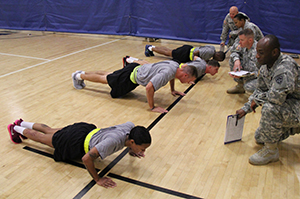

 Increased physical activity is important in efforts to lose weight because it increases energy expenditure and plays an integral role in weight maintenance. Physical activity also reduces the risk of heart disease more than that achieved by weight loss alone. In addition, increased physical activity may help reduce body fat and prevent the decrease in muscle mass often found during weight loss. For the obese patient, activity should generally be increased slowly, with care taken to avoid injury. A wide variety of activities and/or household chores, including walking, dancing, gardening, and team or individual sports, may help satisfy this goal. All adults should set a long-term goal to accumulate at least 30 minutes or more of moderate-intensity physical activity on most, and preferably all, days of the week.
Increased physical activity is important in efforts to lose weight because it increases energy expenditure and plays an integral role in weight maintenance. Physical activity also reduces the risk of heart disease more than that achieved by weight loss alone. In addition, increased physical activity may help reduce body fat and prevent the decrease in muscle mass often found during weight loss. For the obese patient, activity should generally be increased slowly, with care taken to avoid injury. A wide variety of activities and/or household chores, including walking, dancing, gardening, and team or individual sports, may help satisfy this goal. All adults should set a long-term goal to accumulate at least 30 minutes or more of moderate-intensity physical activity on most, and preferably all, days of the week.Most weight loss occurs because of decreased caloric intake. Sustained physical activity is most helpful in the prevention of weight regain. In addition, physical activity is beneficial for reducing risks for cardiovascular disease and type 2 diabetes, beyond that produced by weight reduction alone. Many people live sedentary lives [and] have little training or skills in physical activity...The need to avoid injury during physical activity is a high priority… [so] for most physical activity should be initiated slowly, and the intensity should be increased gradually. Initial activities may be increasing small tasks of daily living such as taking the stairs or walking or swimming at a slow pace.
A moderate amount of physical activity can be achieved in a variety of ways. People can select activities that they enjoy and that fit into their daily lives. Because amounts of activity are functions of duration, intensity and frequency, the same amounts of activity can be obtained in longer sessions of moderately intense activities (such as brisk walking) as in shorter sessions of more strenuous activities (such as running).
A regimen of daily walking is an attractive form of physical activity for many people, particularly those who are overweight or obese. The patient can start by walking 10 minutes, 3 days a week, and can build to 30 to 45 minutes of more intense walking at least 3 days a week and increase to most, if not all, days.
(Source: National Institutes of Health)
- Gradually increase the intensity and duration of any new workout.
- Vary your workouts to include a combination of strength, endurance, balance, agility, and coordination training.
- Train your core muscles (4 For the Core) to reduce the risk of low back injuries.
- Wear a mouth guard for high-risk activities like combatives and contact sports.
- If you experience an injury, see your BN medical provider right away.
- Dynamic warm-ups (moving through the range of motion for each target area) before exercising increase temperature of the tissue and help optimize performance.
- Warm-ups tailored to a specific activity enhance performance.
- Always warm-up before sports and exercise workouts.
- Warm-up specifically for each APFT event.
- Walk before jogging; jog before running; run before sprinting.
- Increase your running mileage by no more then 10% a week.
- Cross training is important....try not to run more than 30 minutes, 3 days per week unless you are an experienced runner.
- Follow PRT guidelines for "speed running" to improve APFT 2-mile run performance.
- Replace your shoes when they become worn.
 Injury prevention measures implemented during sports, exercise, and physical activity-related activities help to maintain the long-term health of the Army. Proper physical training will prepare Soldiers for the physical demands of their mission.
Injury prevention measures implemented during sports, exercise, and physical activity-related activities help to maintain the long-term health of the Army. Proper physical training will prepare Soldiers for the physical demands of their mission.SMART Training Tips:
Preparing for Activity:
Guidelines for Running:

 The Performance Triad is a comprehensive plan to promote Sleep, Activity, and Nutrition within the Total Army (Soldiers, Civilians and Family Members) in order to improve health and wellness. The Triad supports an important Ready and Resilient Functional Area: Physical Health! Health and wellness may be achieved by maintaining an active lifestyle. An active lifestyle helps you maintain a healthy weight. Being overweight is a risk factor for heart disease, certain types of cancer and type 2 diabetes. You can boost your chances of living a longer life and increasing the quality of life if you maintain an active lifestyle.
The Performance Triad is a comprehensive plan to promote Sleep, Activity, and Nutrition within the Total Army (Soldiers, Civilians and Family Members) in order to improve health and wellness. The Triad supports an important Ready and Resilient Functional Area: Physical Health! Health and wellness may be achieved by maintaining an active lifestyle. An active lifestyle helps you maintain a healthy weight. Being overweight is a risk factor for heart disease, certain types of cancer and type 2 diabetes. You can boost your chances of living a longer life and increasing the quality of life if you maintain an active lifestyle.










